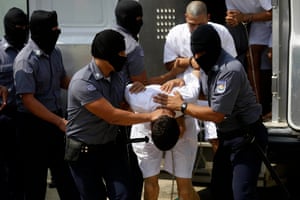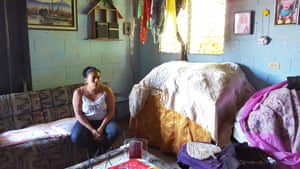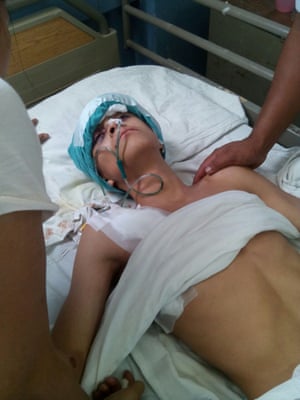State security forces have turned the war on gangs into an extrajudicial siege in Distrito Italia, where young men are being killed indiscriminately with impunity.

A masked and armed policeman patrols a gang-controlled neighborhood in San Salvador. Violence has heightened between police and gangs in response to government crackdown. Photograph: Alex Peña/AP
 Nina Lakhani, 6 febrero 2017 / THE GUARDIAN
Nina Lakhani, 6 febrero 2017 / THE GUARDIAN
![]() A group of teenage boys were celebrating a birthday with cake and cold beers, larking around and uploading selfies to Facebook. It should have been an ordinary scene played out among old friends, but in El Salvador, these are anything but ordinary times.
A group of teenage boys were celebrating a birthday with cake and cold beers, larking around and uploading selfies to Facebook. It should have been an ordinary scene played out among old friends, but in El Salvador, these are anything but ordinary times.
Shortly before 11pm, soldiers with rifles quietly descended from the surrounding hills and cornered the youngsters in an alleyway. Most of the teens were were thrown face-down on the ground – but two boys ran, and the soldiers gave chase.
Juanita Ortega was getting ready for bed when she realised that her son Pablo, 19, was in danger.
“Bang! Bang! Bang! I heard gun shots and ran outside to look for my son,” said Ortega, who asked that she and her son be referred to with pseudonyms for fear of reprisal.
“They were hitting the boys on the ground with their rifle butts. I shouted to my neighbours – ‘Get up! Come quickly! They’re going to kill our children!’ – and then I realised my son wasn’t there,” she said.
Pablo made a break for the dusty main street, but a bullet caught him in the thigh and he fell to the ground. Soldiers dragged him to an overgrown patch of waste ground nearby, where he was later found dead, apparently strangled with his own shirt.
Almost immediately, a white double cabin pick-up arrived at the scene. A different group of soldiers were dropped off, and the unit which had carried out the attack was driven away, witnesses said.
Forensic scientists arrived several hours later to take away the body. No witnesses were interviewed. Morning newspapers reported the incident as the death of another gang member.
Distrito Italia is an impoverished neighbourhood just north of San Salvador whose cosmopolitan name belies a grim reality. For years, it has been dominated by the Mara Salvatrucha (MS13), one of the country’s two main street gangs, who for the past 25 years have been locked in a battle to control territory.
But the street gangs are not the only factions involved in the violence. State security forces have laid virtual siege to gang-controlled communities where being a young male is enough to get you arrested, tortured or killed.
The government’s promise to apply a mano dura (“iron fist”) policy against gangs seems to have become a shoot-to-kill policy under which anyone living in a gang-controlled neighbourhood risks falling victim to extrajudicial violence.
While some of the victims have been gang members, others have nothing to do with organised crime. Pablo Ortega had only finished high school a few days before he was killed.
“I saw soldiers covering the pool of blood with earth where my son fell,” sobbed Ortega, inside her modest home. “The authorities say he was killed in a shootout with gang members, but it’s a lie, he was never a gangster.”
The interview is interrupted by the sound of a gun being loaded just outside the window. Two police officers saunter past with their hands ready on their pistols; dogs bark, doors slam shut.
“I’m scared, you have to go, I have another son,” pleads Ortega. “It’s like during the [civil] war, they’re killing young people but talking about it can get you killed as well.”
El Salvador’s 12-year war between leftwing guerrillas and US-supported military dictatorships left 80,000 dead, 8,000 missing and a million displaced in 12 years.
The conflict ended in 1992, but peace never came to this small Central American country: although the murder rate dropped 20% last year, El Salvador remains the most deadly country in the world after Syria.
During the civil war, the conflict was described in cold war terms: the government described its enemies as terrorists. Nowadays, the violence continues, but the language has changed: a law passed last year established the gangs as “terrorist groups”.
“In the 1980s, having long hair and carrying a book made you a target; being young still makes you a target today,” said Jeanne Rikkers, director of research at the violence prevention NGO Cristosal.
Yet it could have been different. After years of escalating violence, the murder rate almost halved in mid-2012 after government-appointed negotiators helped facilitate a truce between MS13 andd its main rival Barrio, 18. The deal was imperfect, but for the first time in years, there was some hope of peace.
By mid-2014, however, the truce had fallen apart amid broken promises, political rivalries and tough-on-crime electioneering.
The FLMN – founded by former rebels – won a second term in government and soon declared war on the gangs. In January 2015 vice-president Oscar Ortíz gave security forces the green-light to use deadly force against suspected gang members “without any fear of suffering consequences”.

Gang members are escorted upon arrival at a maximum security prison in Zacatecoluca in El Salvador. Photograph: Marvin Recinos/AFP/Getty Images
And they have. Police records obtained by the investigative news website El Faro show that 693 alleged gang members were killed and 255 were injured in 1,074 armed confrontations between January 2015 and August 2016.
In the same period, 24 police and soldiers were killed. That imbalance points to the excessive use of lethal force and summary execution, said Ignacio Cano, a police violence expert at the State University of Rio de Janeiro.
In contrast, police officers arrested just 88 suspected gang members in the whole of 2013 and 2014.
Rikkers said: “The public discourse is warlike. It focuses on eliminating gang members – not crime. [But] the mano dura approach hasn’t worked and won’t suddenly start to work in the future. In the meantime, we are turning a blind eye to grave human rights abuses.”
Those who speak out are often targeted themselves.
Pablo’s murder was among dozens of suspected unlawful killings documented by Dany Romero, a former MS13 member who dedicated himself to violence prevention after his release from prison in 2006.
Last July, he was arrested, accused of using his NGO as a front for gang activities, and detained in maximum-security on terrorism charges.
“Dany had a lot of information that could be a big problem for the state,” said Arnau Baulenas, legal director at the Central American University’s Institute of Human Rights.
Such cases mean that victims’ relatives are wary of speaking out.
Since her son’s death last year, Ortega has often seen the same unit of soldiers in her neighbourhood, but has not dared denounce them to the authorities, for fear of putting her surviving son at risk. “I tell you sincerely, we fear the soldiers more than we ever feared the gangsters,” said Ortega.
Those who monitor the killings say that similarities between the cases cannot be dismissed.
In June, another young man in Distrito Italia was killed in similar circumstances.

Marcela Beltran at her home which police have raided several times since the attempted murder of her son Cristian. Photograph: Nina Lakhani
The family of Jaime Velásquez, 22, admit that he was a gang member. (They asked for him to be referred to with a pseudonym to protect his surviving relatives).
One night in June 2016, he was on lookout duty, when the soldiers arrived. He was shot seven times and left lying in the street. Witnesses told the Guardian there was no gun battle, and no soldiers were injured. A pick-up truck arrived to take the soldiers away. There was no police investigation.
“The soldiers don’t protect us, they kills us like dogs,” said Velásquez’s older sister
Prosecutors say many of the abuse allegations are concocted by the gangs, and deny being lenient on security forces.
“To date, no investigation has made us think that there is a policy of extrajudicial killings or death squads,” sad Allan Hernandez, director of specialist units.
“I can guarantee you 100% that prosecutors treat every murder with the same interest. A murder is a murder … In each case we look at the evidence.”
San Miguel Tepezontes is a picturesque rural town 20 miles east of the capital, situated high above Lake Ilopango. It doesn’t have Distrito Italia’s air of menace, but police say two rival gangs operate here, and last September dozens were arrested in a round-up of alleged MS13 members .
One of them was Cristian Hernández Beltrán, a car mechanic.
Nine months earlier Hernández, then 19, had been detained along with a friend by police officers, and driven to an isolated hillside a few miles away. Hernandez was given electric shocks, and beaten round the head with a rock; his fingernails were pulled out.
His unformed attackers threw him into the back of the police truck assuming he was dead, and drove a few miles along a country road before dumping him in the undergrowth. Somehow he managed to crawl into the road and was discovered by a neighbour.
His mother, Marcela Beltran, found him in hospital in an induced coma with grave injuries to his skull and brain. Hernandez didn’t recognise her for a month. He has permanent damage to his vision, hearing, sense of taste and balance, and needs reconstructive surgery to repair his skull.
Beltran, 34, reported the attack immediately, and managed to convince the police to launch a full investigation. But her determination has come at a high price.
The day after Cristian was released from hospital, the perpetrators came to the family home. Over the next few months, he was followed, detained and beaten again, until finally, in September, he was arrested again and accused of extortion and abetting gang murders.
In a success of sorts, three police officers and two soldiers have been accused of Cristian’s attempted murder. But the teenager remains in prison on charges of belonging to a terrorist group.
“My son isn’t a gangster, he’s been persecuted to make me shut up. Cristian is scared they will kill me, they could kill us all, but I won’t stop – the police cannot be untouchable,” said Beltran.





